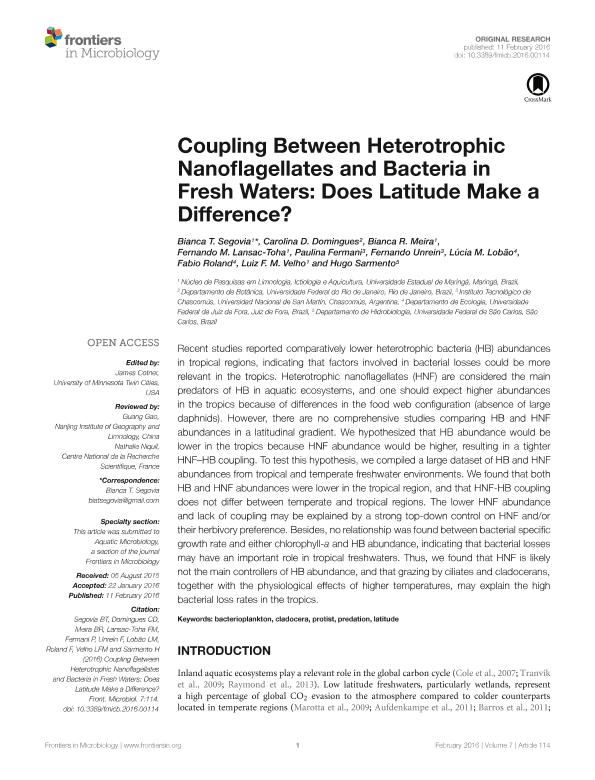Mostrar el registro sencillo del ítem
dc.contributor.author
Segovia, Bianca T.
dc.contributor.author
Domingues, Carolina D.
dc.contributor.author
Meira, Bianca R.
dc.contributor.author
Lansac Toha, Fernando M.
dc.contributor.author
Fermani, Paulina

dc.contributor.author
Unrein, Fernando

dc.contributor.author
Lobão, Lúcia M.
dc.contributor.author
Roland, Fabio
dc.contributor.author
Velho, Luiz F. M.
dc.contributor.author
Preto de Morais Sarmento, Hugo Miguel

dc.date.available
2018-08-03T17:07:57Z
dc.date.issued
2016-02
dc.identifier.citation
Segovia, Bianca T.; Domingues, Carolina D.; Meira, Bianca R.; Lansac Toha, Fernando M.; Fermani, Paulina; et al.; Coupling between heterotrophic nanoflagellates and bacteria in fresh waters: Does latitude make a difference?; Frontiers Research Foundation; Frontiers in Microbiology; 7; 114; 2-2016; 1-11
dc.identifier.issn
1664-302X
dc.identifier.uri
http://hdl.handle.net/11336/54078
dc.description.abstract
Recent studies reported comparatively lower heterotrophic bacteria (HB) abundances in tropical regions, indicating that factors involved in bacterial losses could be more relevant in the tropics. Heterotrophic nanoflagellates (HNF) are considered the main predators of HB in aquatic ecosystems, and one should expect higher abundances in the tropics because of differences in the food web configuration (absence of large daphnids). However, there are no comprehensive studies comparing HB and HNF abundances in a latitudinal gradient. We hypothesized that HB abundance would be lower in the tropics because HNF abundance would be higher, resulting in a tighter HNF-HB coupling. To test this hypothesis, we compiled a large dataset of HB and HNF abundances from tropical and temperate freshwater environments. We found that both HB and HNF abundances were lower in the tropical region, and that HNF-HB coupling does not differ between temperate and tropical regions. The lower HNF abundance and lack of coupling may be explained by a strong top-down control on HNF and/or their herbivory preference. Besides, no relationship was found between bacterial specific growth rate and either chlorophyll-a and HB abundance, indicating that bacterial losses may have an important role in tropical freshwaters. Thus, we found that HNF is likely not the main controllers of HB abundance, and that grazing by ciliates and cladocerans, together with the physiological effects of higher temperatures, may explain the high bacterial loss rates in the tropics.
dc.format
application/pdf
dc.language.iso
eng
dc.publisher
Frontiers Research Foundation

dc.rights
info:eu-repo/semantics/openAccess
dc.rights.uri
https://creativecommons.org/licenses/by/2.5/ar/
dc.subject
Bacterioplankton
dc.subject
Cladocera
dc.subject
Latitude
dc.subject
Predation
dc.subject
Protist
dc.subject.classification
Otras Ciencias Biológicas

dc.subject.classification
Ciencias Biológicas

dc.subject.classification
CIENCIAS NATURALES Y EXACTAS

dc.title
Coupling between heterotrophic nanoflagellates and bacteria in fresh waters: Does latitude make a difference?
dc.type
info:eu-repo/semantics/article
dc.type
info:ar-repo/semantics/artículo
dc.type
info:eu-repo/semantics/publishedVersion
dc.date.updated
2018-08-03T14:18:16Z
dc.journal.volume
7
dc.journal.number
114
dc.journal.pagination
1-11
dc.journal.pais
Suiza

dc.journal.ciudad
Lausana
dc.description.fil
Fil: Segovia, Bianca T.. Universidade Estadual de Maringá; Brasil
dc.description.fil
Fil: Domingues, Carolina D.. Universidade Federal do Rio de Janeiro; Brasil
dc.description.fil
Fil: Meira, Bianca R.. Universidade Estadual de Maringá; Brasil
dc.description.fil
Fil: Lansac Toha, Fernando M.. Universidade Estadual de Maringá; Brasil
dc.description.fil
Fil: Fermani, Paulina. Consejo Nacional de Investigaciones Científicas y Técnicas. Centro Científico Tecnológico Conicet - La Plata. Instituto de Investigaciones Biotecnológicas. Instituto de Investigaciones Biotecnológicas ; Argentina
dc.description.fil
Fil: Unrein, Fernando. Consejo Nacional de Investigaciones Científicas y Técnicas. Centro Científico Tecnológico Conicet - La Plata. Instituto de Investigaciones Biotecnológicas. Instituto de Investigaciones Biotecnológicas ; Argentina
dc.description.fil
Fil: Lobão, Lúcia M.. Universidade Federal de Juiz de Fora; Brasil
dc.description.fil
Fil: Roland, Fabio. Universidade Federal de Juiz de Fora; Brasil
dc.description.fil
Fil: Velho, Luiz F. M.. Universidade Estadual de Maringá; Brasil
dc.description.fil
Fil: Preto de Morais Sarmento, Hugo Miguel. Universidade Federal do São Carlos; Brasil
dc.journal.title
Frontiers in Microbiology
dc.relation.alternativeid
info:eu-repo/semantics/altIdentifier/doi/http://dx.doi.org/10.3389/fmicb.2016.00114
dc.relation.alternativeid
info:eu-repo/semantics/altIdentifier/url/https://www.frontiersin.org/articles/10.3389/fmicb.2016.00114/full
Archivos asociados
